Portugal’s brittle healthcare system is under growing pressure due to an unprecedented rise in coronavirus infections as a result of a relaxation of the measures during Christmas.

Even after a stricter lockdown was put in place on the 15th of January, the number of new cases continued to rise to over 1000 per 100.000 inhabitants. Nearly double that in hard-hit Spain and three times as much as in the Netherlands. This week’s increase is even the biggest in the world!

The health system – which prior to the pandemic had the lowest number of critical care beds per 100.000 inhabitants in Europe – can accommodate a maximum number of 675 Covid patients in ICUs. Currently, more than 95% of the ICU beds are occupied and a further increase in the number of patients is expected over the coming weeks.
‘The impact in hospitals is huge because the number of beds doesn’t increase, the walls are not expandable and health workers are not multiplying’ declared Antonio Pais de Lacerda, a doctor at Lisbon’s biggest hospital Santa Maria.

It is predicted that as many people will die in the next two months as in the last ten and that daily case numbers will not drop before February. Media images of ambulances with patients queuing outside major hospitals in Lisbon waiting for beds, raise fears whether the National Health System (SNS) is on the verge of collapse.

At a recent Infarmed meeting – where government hears the opinion of experts – it was estimated that it will take at least two months for the country to return to pre-Christmas levels. The feeling also was that testing – currently around 47,000 tests a day with around 18% positive results – should be increased, especially in old people’s homes.
With a daily death toll reaching a record high of 218 – one death every seven minutes – and 10.455 new cases, the authorities desperately try to put a lid on the spread of infections. In a country just over 10 million already over 9000 people have died since the start of the pandemic.

In view of the unacceptable rise in the number of cases and deaths, Prime Minister António Costa issued – just 3 days after a stricter lockdown was put in place – even tougher restrictions, similar to the ones during the lockdown of March/April last year. Schools, however, will remain open, much to the dislike of the Ordem dos Médicos, that has called for an immediate closure to save lives.
It will be clear that protection of the elderly has failed and that until a successful roll-out of the vaccination programme is in place, tension will prevail.
Stay healthy Fique saudável (pic Público/Expresso)


















 Portugal’s successful battle against Covid-19 has come under international media spotlight and regarded by many as exemplary. With a quarter of the population of big brother Spain, Portugal has around one-tenth of the number of cases and a three times lower mortality rate.
Portugal’s successful battle against Covid-19 has come under international media spotlight and regarded by many as exemplary. With a quarter of the population of big brother Spain, Portugal has around one-tenth of the number of cases and a three times lower mortality rate. There are a number of different theories for why the virus has caused so much less suffering than in neighbouring Spain.
There are a number of different theories for why the virus has caused so much less suffering than in neighbouring Spain.
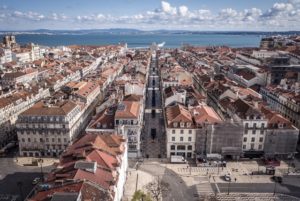 Lisbon’s streets are left to joggers and cats, its glorious beaches cordoned off, the economy asphyxiated, border crossings to Spain sealed, schools and universities
Lisbon’s streets are left to joggers and cats, its glorious beaches cordoned off, the economy asphyxiated, border crossings to Spain sealed, schools and universities  Nevertheless, the government prepares to gradually
Nevertheless, the government prepares to gradually 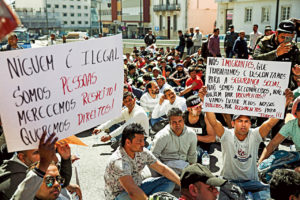 All migrants, including asylum seekers with pending applications at immigration (Serviço de Estrangeiros e Fronteiras), will be treated as permanent residents until at least July 1, granting them full access to the National Health Service, welfare benefits, bank accounts, work, and rental contracts during the corona outbreak.
All migrants, including asylum seekers with pending applications at immigration (Serviço de Estrangeiros e Fronteiras), will be treated as permanent residents until at least July 1, granting them full access to the National Health Service, welfare benefits, bank accounts, work, and rental contracts during the corona outbreak. The
The  Portugal declared the State of
Portugal declared the State of  Schools in Portugal even closed before any deaths were registered.
Schools in Portugal even closed before any deaths were registered. Portugal is doing comparatively well so far. But the authorities’ advice to stay at home and keep distance has to be maintained to prevent further suffering. Researchers at the Imperial College in London suggested that without these measures deaths in Portugal could reach 70,000.
Portugal is doing comparatively well so far. But the authorities’ advice to stay at home and keep distance has to be maintained to prevent further suffering. Researchers at the Imperial College in London suggested that without these measures deaths in Portugal could reach 70,000. With the peak of the virus predicted in May, it is becoming increasingly clear that quarantine measures in Portugal probably have to stay in force till the end of June.
With the peak of the virus predicted in May, it is becoming increasingly clear that quarantine measures in Portugal probably have to stay in force till the end of June. To finish off with a quote of the famous Dutch footballer Johan Cruijff ‘ every disadvantage has its advantage.’
To finish off with a quote of the famous Dutch footballer Johan Cruijff ‘ every disadvantage has its advantage.’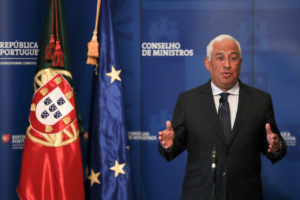 When the number of confirmed coronavirus cases surpassed the 1,000 mark – with six reported deaths – the Portuguese Government announced the State of
When the number of confirmed coronavirus cases surpassed the 1,000 mark – with six reported deaths – the Portuguese Government announced the State of 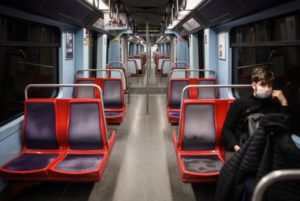 Non-essential business and schools closed. People urged to leave their houses only for food, medicines and walking the dog. Remote working from home became the rule.
Non-essential business and schools closed. People urged to leave their houses only for food, medicines and walking the dog. Remote working from home became the rule. 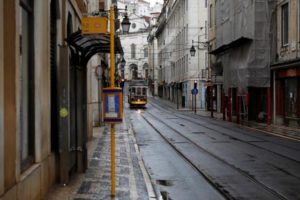 ‘Social distancing’ and ‘protecting the elderly’ have become keywords in the fight against the new virus – Severe Acute Respiratory Syndrome Corona Virus 2 (SARS-CoV-2).
‘Social distancing’ and ‘protecting the elderly’ have become keywords in the fight against the new virus – Severe Acute Respiratory Syndrome Corona Virus 2 (SARS-CoV-2). The intention of prime minister Antonio Costa is not to close the country down – like in France – even though he has the constitutional support with this State of Emergency to do so. The government, however, will – given the developments in Spain and Italy where the death tolls are the worst in Europe – implement further restrictions if necessary.
The intention of prime minister Antonio Costa is not to close the country down – like in France – even though he has the constitutional support with this State of Emergency to do so. The government, however, will – given the developments in Spain and Italy where the death tolls are the worst in Europe – implement further restrictions if necessary.